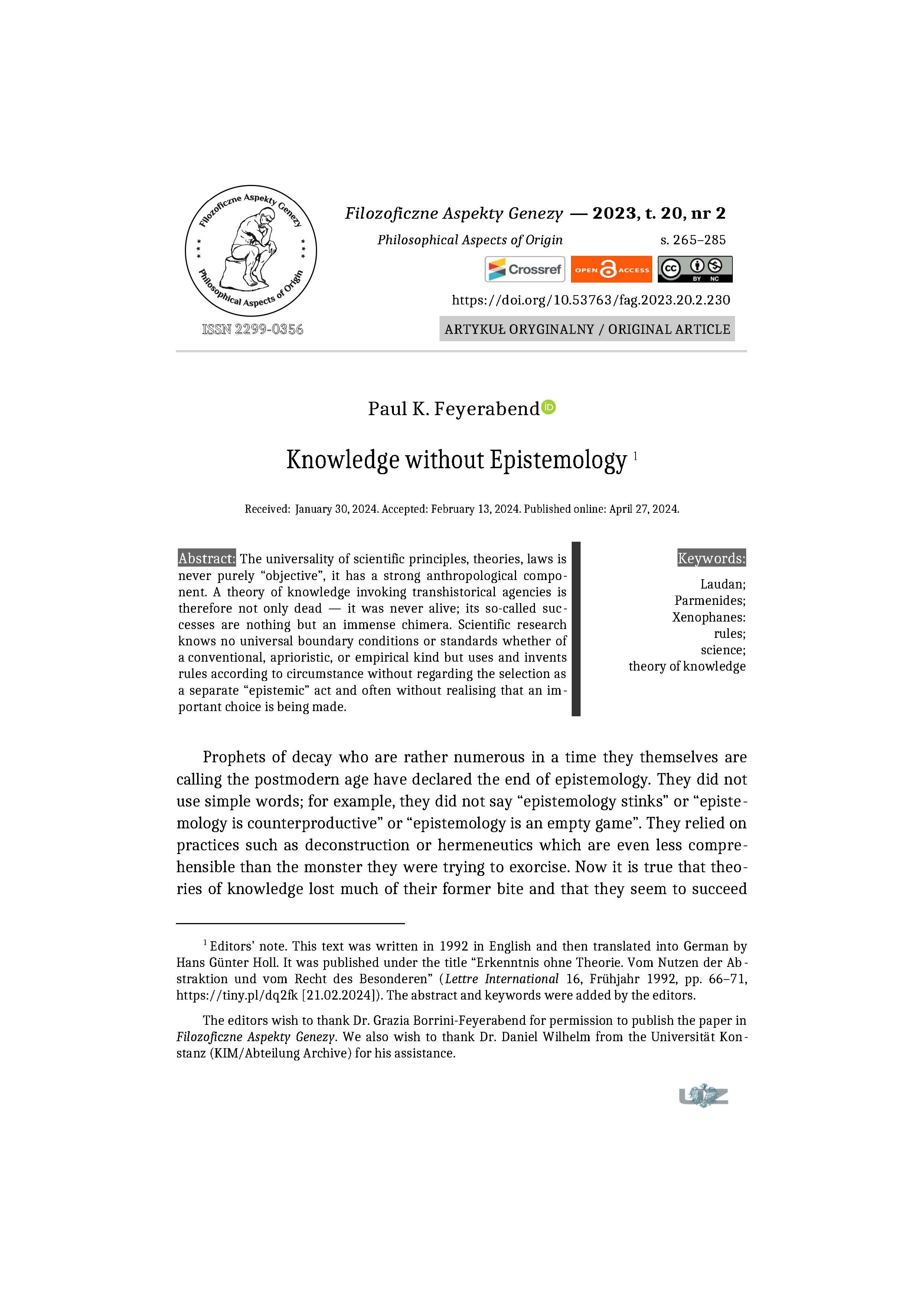
Opublikowane 27.04.2024 — zaktualizowane 28.05.2024
Wersje
- 28.05.2024 - (2)
- 27.04.2024 - (1)
Słowa kluczowe
- Laudan,
- Parmenides,
- Xenophanes,
- rules,
- science
- theory of knowledge ...More
Prawa autorskie (c) 2023 Filozoficzne Aspekty Genezy

Utwór dostępny jest na licencji Creative Commons Uznanie autorstwa – Użycie niekomercyjne 4.0 Międzynarodowe.
Jak cytować
Abstrakt
The universality of scientific principles, theories, laws is never purely “objective”, it has a strong anthropological component. A theory of knowledge invoking transhistorical agencies is therefore not only dead — it was never alive; its so-called successes are nothing but an immense chimera. Scientific research knows no universal boundary conditions or standards whether of a conventional, aprioristic, or empirical kind but uses and invents rules according to circumstance without regarding the selection as a separate “epistemic” act and often without realising that an important choice is being made.
Downloads
Bibliografia
- Artaud Antonin, The Theatre and its Double, trans. Mary Caroline Richards, Grove Press Books, New York 1958.
- Davies P.C.W. and Brown Julian (eds.), Superstrings: A Theory of Everything?, Cambridge University Press, New York 1988.
- Diels Hermann, Kranz Walther, Die Fragmente der Vorsokratiker, Weidmannsche Buchhandlung, Berlin 1959.
- Eliade Micrea, Geschichte der religiösen Ideen, Band 2, Freiburg im Breisgau, Herder 1979.
- Exner Felix M., Notiz zu Brown’s Molecularbewegung, Annalen der Physik 1900, Vol. 502, No. 2–3, pp. 843–847, https://doi.org/10.1002/andp.19003070813. DOI: https://doi.org/10.1002/andp.19003070813
- Guthrie William Keith Chambers, A History of Greek Philosophy, Vol. 1, Cambridge University Press, Cambridge 1962.
- Galgano Nicola Stefano, Non-being in Parmenides, DK B2, Anais de Filosofia Clássica 2020, Vol. 28, n.6, pp. 1–34.
- Hegel Georg Wilhelm Friedrich, Werke, Band 18, Vorlesungen über die Geschichte der Philosophie I, Suhrkamp Verlag Frankfurt am Main 1971.
- Hegel Georg Wilhelm Friedrich, Werke, Band 19, Vorlesungen über die Geschichte der Philosophie II, Suhrkamp Verlag Frankfurt am Main 1971.
- Laudan Larry, Science and Relativism: Some Key Controversies in the Philosophy of Science, University of Chicago Press, Chicago 1990. DOI: https://doi.org/10.7208/chicago/9780226219332.001.0001
- Luria Alexandr R., The Making of Mind: A Personal Account of Soviet Psychology, Harvard University Press, Cambridge 1979.
- Luria Salvador Edward, A Slot Machine, a Broken Test Tube: An Autobiography, Harper & Row, New York 1985.
- Nietzsche Friedrich, Die Philosophie im tragischen Zeitalter der Griechen, in: Friedrich Nietzsche (ed.), Werke in drei Bänden, Band 3, Carl Hanser, München 1954, pp. 353–388.
- Popper Karl R., Auf der Suche nach einer besseren Welt, Piper, München 1984.
- Zahar Elie, Einstein’s Revolution: A Study in Heuristic, Open Court, Chicago and La Salle, Ill. 1989.


